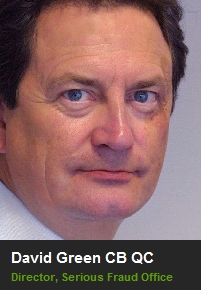Bribery Act & Proceeds of Crime - Written by Barry & Richard on Sunday, July 5, 2015 1:55 - 0 Comments
The View From Cockspur Street: “Misconception” SFO doesn’t want internal investigations. We say – remember the golden rule…
 Last year Ben Morgan, joint head of the Bribery Division of the SFO when he said:
Last year Ben Morgan, joint head of the Bribery Division of the SFO when he said:
“Crucially, where suspicions of corrupt activity arise, we do not require you to carry out internal investigations; investigation is our job. And while we do understand that up to a point you will need to do some work to look into allegations of bribery, we find internal investigations that ‘trample over the crime scene’ to be unhelpful. Our stance is to ask for genuine cooperation with our investigation, not duplication of it. We don’t expect you to keep us in the dark while you carry out extensive private investigations and some months or even years later present us with a package of your findings. If there is suspected criminal conduct, that is our job and there are some important issues around access to, and integrity of, evidence (especially regarding witness accounts) and we expect those to be respected in the same way they would be in any other criminal investigation. We expect you to engage with us early, and to work with us as we investigate, not to rush ahead and, whether intentionally or not, complicate the work we need to do. This is, we appreciate, to some extent a departure from the way things used to be and the way certain practices have built up in other jurisdictions, but we make no apology for that. Our job is to investigate possible criminal offences and we take a very dim view of anything anyone does that makes that job more difficult than it needs to be.”
Some misconstrued this as meaning that the SFO was anti-internal investigations.
We have previously made the observation that companies must be given the opportunity to look into possible wrongdoing to determine whether or not the allegations ‘have legs’ or not.
Otherwise law enforcement could be deluged with a tsunami of reports which would risk creating a haystack of false positives they cannot deal with given their limited resources.
In a helpful recent speech to an audience at Herbert Smith, badged as the “view from Cockspur Street” reiterated at the London C5 conference last week David Green QC, Director of the Serious Fraud Office (“SFO”) clarified the position around cooperation and internal investigations.
Mr Green said it was a “misconception” that the SFO was opposed to companies undertaking their own internal investigations into suspected wrongdoing and acknowledged that companies will often wish to undertake their own investigation using their own lawyers.
Mr. Green repeated the observation at the C5 conference and it was reported commented broadly that the key was not to churn up the crime scene.
This is not only eminently sensible it is a statement of what, should in our view, be the [insert word] obvious.
But we have heard some, including advisers, say that they don’t understand what ‘churn up the crime scene’ means.
As they say…if you have to ask the question…
If you are undertaking an internal investigation care must be taken.
The golden rule?
Evidence must be preserved.
This applies to all evidence, documentary, electronic and individuals accounts. On the latter steps must be taken to ensure that any internal investigation does not risk enabling witnesses to come up with revisionist history accounts (again whether intentionally or not – if you have been following our behavioural science series of posts you will know the mind plays tricks on us).
If being conducted internally to save money investigations should nevertheless be conducted forensically and a record kept of the steps taken – so the chain of custody of evidence is clear.
An internal investigation should, at the end of the day, be something which could assist a prosecutor in bringing a prosecution (say of a rogue employee). Not something which renders any such possibility more difficult.
The short point is that if a company needs to undertake an internal investigation it really needs people who know what they are doing – doing it.
There are many potential pitfalls involved and it is worth keeping in mind that there are key differences between UK SFO expectations and US (and other) expectations.
At the end of the day, an internal investigation should be something which is a step on the road to sorting out and fixing a problem.
Not something which compounds problems.
For those Hill Street Blues aficionados:


